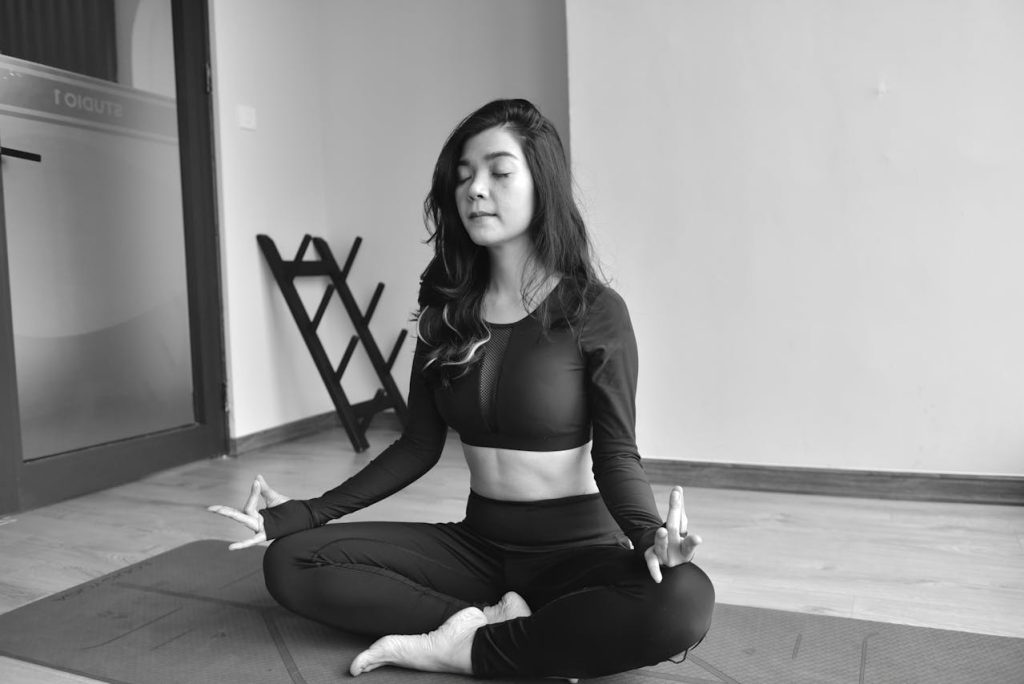Discover effective stress-relieving meditation techniques to calm your mind, reduce anxiety, and enhance overall well-being. Learn simple methods for daily practice.
Overview
In today’s fast-paced world, stress has become an unavoidable part of our lives. The constant demands of work, family, and social obligations can lead to mental and physical exhaustion. However, relieving stress meditation offers a proven way to manage anxiety, improve mental clarity, and enhance overall health.
In this blog post, readers will learn:
- The science behind meditation and stress relief
- Different types of meditation techniques specifically for stress
- Step-by-step guides for incorporating meditation into daily life
- Tips for maximizing the benefits of meditation
- How Mindfulness Meditation Hub can guide you through your stress-relief journey
By the end of this post, you’ll understand how to use meditation as a powerful tool to achieve calm, focus, and emotional balance.
What is Relieving Stress Meditation?
Relieving stress Meditation is a practice designed to calm the mind, reduce anxiety, and foster a sense of inner peace. Unlike casual relaxation techniques, meditation targets the nervous system, helping regulate cortisol—the hormone responsible for stress.
Benefits of practicing regular stress-relieving meditation include:
- Lowered blood pressure and heart rate
- Improved mood and emotional stability
- Enhanced focus and mental clarity
- Better sleep quality
- Strengthened immune system
This is why meditation is widely recommended by psychologists, wellness experts, and healthcare professionals as a natural and effective stress management tool.

The Science Behind Meditation and Stress Relief
Research has shown that meditation can significantly reduce stress by activating the parasympathetic nervous system, which promotes relaxation. During meditation, the brain shifts from a state of high alertness to one of calm focus, reducing the production of stress hormones like cortisol.
Additionally, mindfulness-based stress reduction (MBSR) programs have been shown to:
- Reduce symptoms of anxiety and depression
- Enhance resilience to stress
- Improve overall psychological well-being
By understanding the scientific foundation of relieving stress through meditation, you can approach your practice with confidence, knowing it’s backed by evidence.
Types of Relieving Stress Meditation Techniques
There are several meditation techniques specifically tailored for stress relief. Here are some of the most effective methods:
1. Mindfulness Meditation
Mindfulness meditation involves paying attention to the present moment without judgment. It encourages you to observe your thoughts and feelings as they arise, rather than reacting to them.
How to practice:
- Find a quiet place to sit comfortably.
- Focus on your breath, noticing each inhale and exhale.
- Gently bring your attention back whenever your mind wanders.
- Practice for 10–20 minutes daily
2. Guided Meditation
Guided meditation uses audio or video recordings where an instructor leads you through relaxation exercises. This is ideal for beginners who need support in focusing their mind.
Benefits:
- Reduces intrusive thoughts and mental chatter
- Promotes deep relaxation
- Can be tailored for specific goals, like stress relief or sleep improvement
3. Body Scan Meditation
This technique involves focusing your attention on different parts of your body, releasing tension as you go.
Steps:
- Lie down or sit comfortably
- Slowly bring awareness to your toes, legs, abdomen, chest, arms, neck, and head.
- Notice sensations without judgment, releasing any tension with each exhale.
4. Loving-Kindness Meditation
Loving-kindness Meditation helps cultivate positive emotions, reducing stress caused by negative thinking.
How to practice:
- Sit comfortably and close your eyes.
- Repeat phrases like “May I be happy, may I be healthy, may I be safe.”
- Gradually extend these wishes to others, including friends, family, and even difficult individuals.

Step-by-Step Guide to Relieving Stress Meditation
For those new to meditation, following a structured routine can make the practice more effective. Here’s a step-by-step guide:
- Set Your Intention: Decide why you want to meditate. It could be for reducing anxiety, improving focus, or enhancing overall well-being.
- Create a Calm Environment: Find a quiet space, free from distractions, and sit comfortably.
- Focus on Your Breath: Pay attention to your inhales and exhales.
- Observe Your Thoughts: Notice thoughts without attachment and gently return focus to your breath.
- Practice Consistently: Aim for at least 10–20 minutes daily. Consistency is key to reducing stress effectively.
Tips to Maximize the Benefits of Relieving Stress Meditation
To achieve the best results, consider these expert tips:
- Be Patient: Stress reduction takes time; don’t get discouraged if you don’t feel immediate results.
- Start Small: Begin with 5–10 minutes and gradually increase your practice time.
- Use Meditation Tools: Apps, guided audio, or videos can help beginners stay on track.
- Incorporate Mindfulness Throughout the Day: Simple practices like mindful walking or mindful eating can complement your meditation sessions.
- Track Your Progress: Journaling about your stress levels and meditation experiences can enhance self-awareness.
How Mindfulness Meditation Hub Can Help
At Mindfulness Meditation Hub, we offer a wide range of resources to support your journey with relieving stress meditation:
- Guided Meditations: Professionally designed audio and video sessions to reduce stress and promote relaxation.
- Meditation Courses: Structured programs for beginners and advanced practitioners.
- Wellness Tips: Practical advice for incorporating mindfulness into daily life.
- Community Support: Access to a supportive community of meditators to share experiences and insights.
Whether you’re dealing with daily stress, work-related anxiety, or emotional overwhelm, our resources provide the guidance you need to cultivate calm and resilience.
Final Thoughts
Incorporating stress-relievingmeditation into your daily routine can transform your mental and physical well-being. By practicing consistently and exploring different meditation techniques, you can reduce stress, increase focus, and nurture a sense of inner peace.
Remember, meditation is a skill, not a quick fix. With patience, guidance, and commitment, you can make stress relief a natural part of your life.
Take the first step today with Mindfulness Meditation Hub and discover how simple meditation practices can lead to profound improvements in your health and happiness.
FAQs for Relieving Stress Meditation
What is relieving stress meditation?
Relieving stress meditation is a mindfulness practice designed to calm the mind, reduce anxiety, and promote emotional balance. It focuses on breath, awareness, and relaxation techniques to manage stress effectively.
How does meditation help reduce stress?
Meditation reduces stress by lowering cortisol levels, slowing the heart rate, and activating the parasympathetic nervous system. This helps the body relax and improves mental clarity and emotional resilience.
How long should I meditate to relieve stress?
Beginners can start with 5–10 minutes per day, gradually increasing to 20–30 minutes. Consistency is more important than duration, and even short daily sessions can provide significant stress relief.
Can beginners practice relieving stress meditation?
Absolutely. Beginners can start with simple techniques like guided meditation or mindful breathing. Over time, they can explore other methods like body scan or loving-kindness meditation.
What are the best types of meditation for stress relief?
Effective techniques include mindfulness meditation, guided meditation, body scan meditation, and loving-kindness meditation. Each method helps reduce anxiety and promotes relaxation in different ways.
Can meditation improve sleep while relieving stress?
Yes. By calming the mind and lowering stress hormones, meditation can improve sleep quality, helping you fall asleep faster and enjoy deeper, more restorative sleep.
How often should I meditate to see results?
Daily practice is ideal. Even 10–20 minutes each day can produce noticeable benefits in stress reduction, emotional balance, and overall mental well-being.
Do I need a quiet place to meditate?
While a quiet environment helps, you can practice meditation anywhere. The key is to focus on your breath and maintain awareness, even in moderately noisy surroundings.
Can guided meditation help me relieve stress faster?
Yes. Guided meditation provides step-by-step instructions, making it easier for beginners to focus, relax, and reduce stress effectively.
What is mindfulness meditation?
Mindfulness meditation is the practice of observing your thoughts, emotions, and sensations without judgment. It helps you stay present and reduces stress caused by overthinking or worrying.
How long does it take for meditation to relieve stress?
Some people notice benefits after a few sessions, but consistent practice over several weeks typically produces significant stress reduction and improved emotional resilience.
Can meditation help with anxiety as well as stress?
Yes. Meditation can reduce both stress and anxiety by calming the nervous system, promoting relaxation, and increasing emotional regulation.
What is loving-kindness meditation?
Loving-kindness meditation involves sending positive thoughts and wishes to yourself and others. It fosters compassion, reduces negative emotions, and can help relieve stress.
Can children practice relieving stress meditation?
Yes. Simple breathing exercises and guided meditations are effective for children, helping them manage stress, improve focus, and cultivate emotional awareness.
How can Mindfulness Meditation Hub help me relieve stress?
Mindfulness Meditation Hub offers guided meditations, courses, and wellness tips designed to reduce stress, improve focus, and enhance overall well-being. Our resources support both beginners and experienced practitioners on their mindfulness journey.

